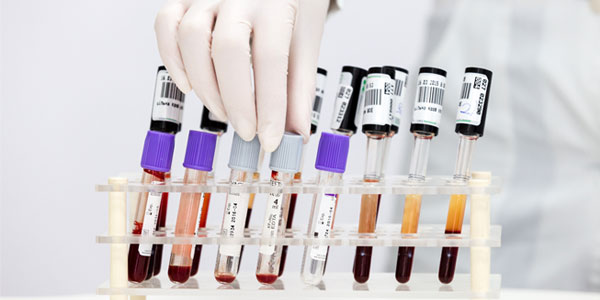Symptoms caused by hormonal issues — such as fatigue, weakness and more — can look like those of many other common conditions, so correctly diagnosing an endocrine disorder can take a bit of detective work.
Once you’ve received a preliminary diagnosis from your primary care doctor, endocrinologists in the Sutter Health network can use a variety of lab tests to measure the levels of various hormones in your body. These tests may reveal which endocrine system glands are not working correctly.
Blood Tests

- Tests to detect diabetes and prediabetes include the blood glucose test and the glycosylated hemoglobin test (A1c). If you’re pregnant, you may receive a glucose tolerance test to screen for gestational diabetes.
- Several tests, primarily a thyroid stimulating hormone (TSH) assessment, can show how well your thyroid is working.
- Other tests can assess for parathyroid conditions.
- Blood tests for luteinizing hormone (LH) and follicle stimulating hormone (FSH) can help to detect female hormonal issues.
- Tests for total testosterone can pinpoint male hormonal issues.
- Other blood tests detect levels of hormones, such as cortisol, 17 hydroxyprogesterone, DHEA-sulfate, ACTH, aldosterone, vitamin D, PTH, prolactin and various forms of estrogen, that affect different systems.
- Tests for thyroglobulin (Tg) levels can monitor thyroid cancer.
Imaging Exams
Your endocrinologist may request imaging exams to look at your endocrine system function.
- Thyroid ultrasound imaging may be used to look at your thyroid’s structure.
- A fine-needle aspiration can help rule out cancer in a thyroid nodule.
- A thyroid scan shows the size, shape and function of the thyroid gland.
- A radioactive iodine uptake test and scan assess thyroid function by measuring how much iodine your thyroid gland uses and where it goes in the gland.
- Several hormones can affect your bone density and put you at risk for osteoporosis. A bone density measurement, a simple X-ray, evaluates your bone health.
- A pituitary gland MRI can reveal abnormalities of that structure.
- A parathyroid scan checks the glands that lie behind or next to the thyroid.
- Adrenal CT scan or MRI determines if there are tumors on the adrenal gland.
- An orbit CT scan checks the area around the eyes for evidence of Graves’ disease, a thyroid disorder.
If a scan shows an abnormality, your doctor may recommend an ultrasound-guided biopsy to remove and evaluate a tissue sample.












